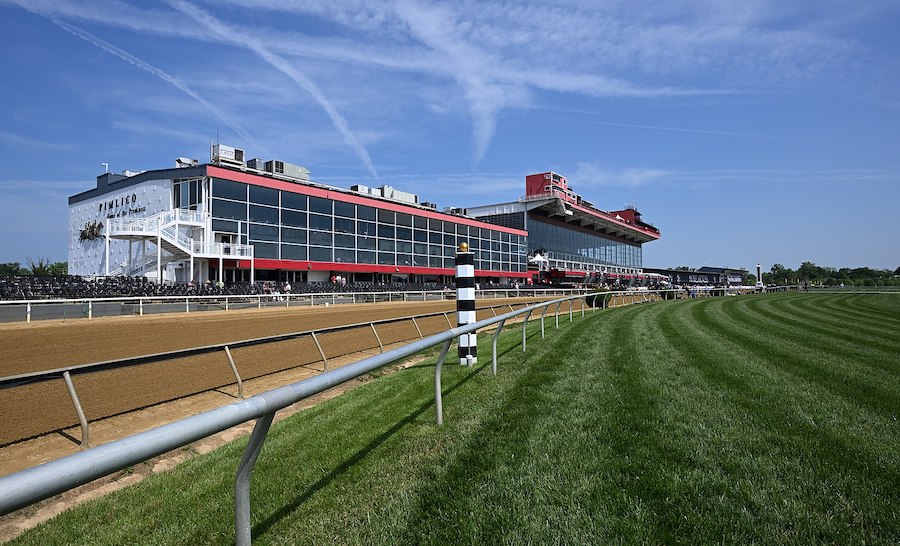
Hoofbeats Give Way to Demolition Equipment at Famed Baltimore Race Track

The 150th running of the Preakness Stakes Saturday May 17 marked the end of an era at Baltimore’s Pimlico Race Course, with the track’s aging facilities set to be demolished as part of a $400-million redevelopment program.
Clark Construction Group will oversee demolition of Pimlico’s 65-year-old clubhouse, horse barns and other buildings under a $14.3-million guaranteed maximum price contract with the Maryland Stadium Authority. Earlier this year, Clark, advertised trade bid packages for site and structural demolition, hazmat abatement, erosion and sediment control, electrical and water, pest control and other services, with 35% MBE participation goal. In October 2024, the state contracted with Clark for approximately $900,000 in preconstruction work.
Demolition activity is scheduled to ramp up this summer, following relocation of the remaining horses occupying Pimlico’s existing stables. Construction will then begin on a program that aims to make the track a year-round destination, with more than 100 race days, including the signature Preakness, the traditional “second jewel” in thoroughbred racing’s Triple Crown.
Approximately 40 new buildings will occupy the revitalized 117-acre Pimlico Race Course, including a new clubhouse/event space with a seating capacity of 5,000, and a design inspired by the original grand Gothic-style clubhouse built when Pimlico opened in 1870. Pimlico’s new horse barns will take a similar approach, housing 400 horses and providing space for non-race-related events.
A proposal to rotate the Pimlico track 30 degrees was discarded, a decision that saves an estimated $30 million in construction costs and accelerates the construction timeline, setting the stage for the Preakness to return to Pimlico in 2027. Next year’s race will be held at Laurel Park, south of Baltimore.
First run at Pimlico in 1873, the Preakness has been held at the storied track annually since 1909. This year’s final race provided some extra drama, with Journalism making a dramatic stretch run to win by a half-length. Secretariat holds the record for fastest Preakness time, winning the 1973 edition of the 1-3/16 mile race in 1:53:00.
In a related project, Maryland will purchase a 328-acre farm in Carroll County to support expanded racing at Pimlico. A $110-million allocation approved last year by the state legislature will fund construction of a new state-of-the art training facility that initially will house 800 horses, with provisions for expansion as needed.
Pimlico joins renovation programs announced or underway at the Triple Crown’s other two host tracks. At Belmont Park on Long Island, AECOM Tishman is more than halfway through a three-year, $455-million rebuild that includes a new five-level 275,000-sq-ft complex featuring a clubhouse with modern amenities and 7,500 canopy-sheltered seats. New drainage systems are being installed for the track’s four racing surfaces, one of which will feature a new synthetic surface. Concrete walls will be covered with resilient surfaces to prevent horse injuries.
Although the scheduled fall 2026 completion of Belmont Park’s reconstruction program falls after the scheduled running of that year’s Belmont Stakes, the New York Racing Association is eyeing the possibility of bringing the race back from its temporary home in Saratoga Springs should conditions permit.
Meanwhile, the owners of Churchill Downs in Louisville, Ky., recently put the brakes on a $900-million plan to renovate three major areas at the home of the Kentucky Derby, citing construction cost uncertainties related to tariff and trade disputes. According to a statement, Churchill Downs will reassess the economic landscape “in the coming months” to evaluate any changes to the multi-year projects’ timing and sequencing.
Two projects totaling approximately $30 million—renovations to 15 suites and an exclusive club area—are underway and scheduled to be complete in April 2026.
Post a Comment
You must be logged in to post a comment.





